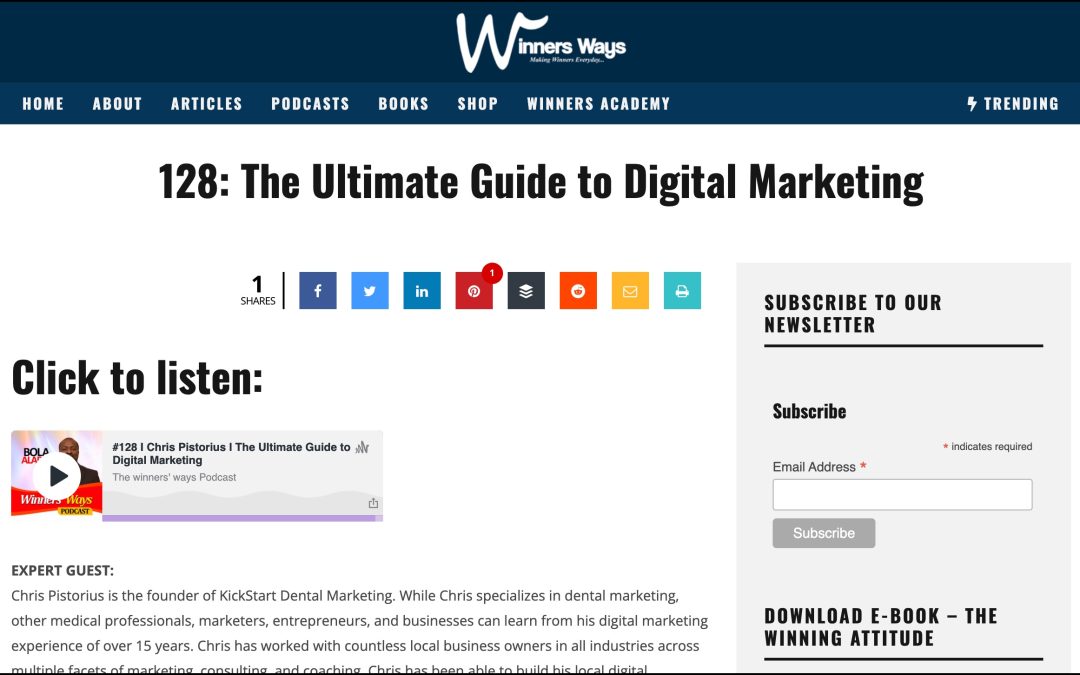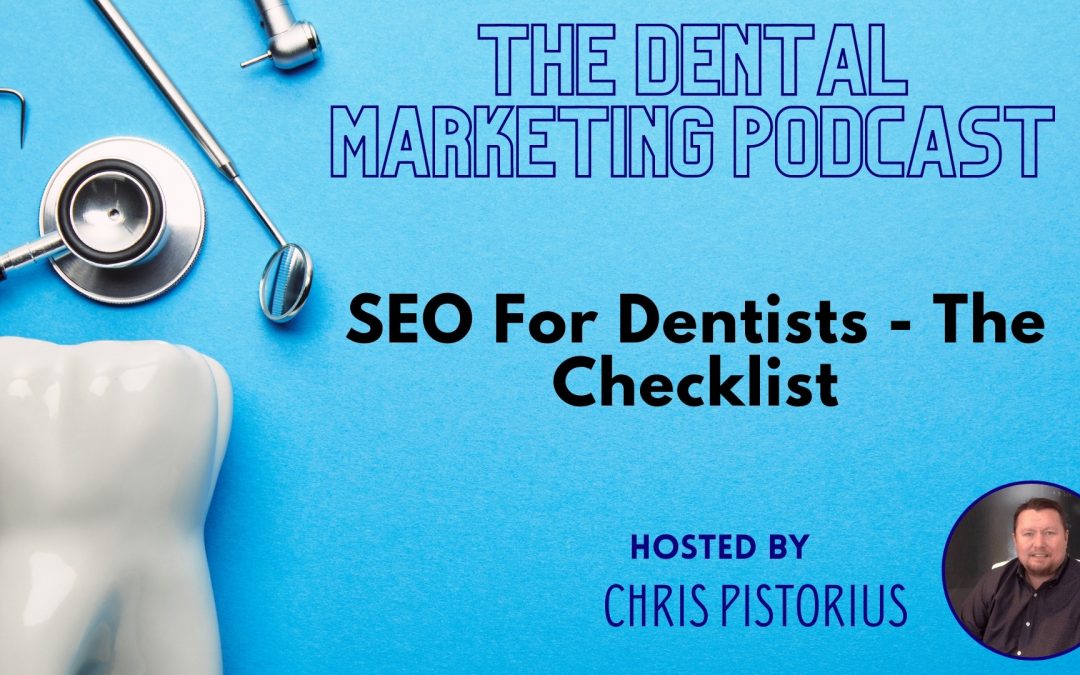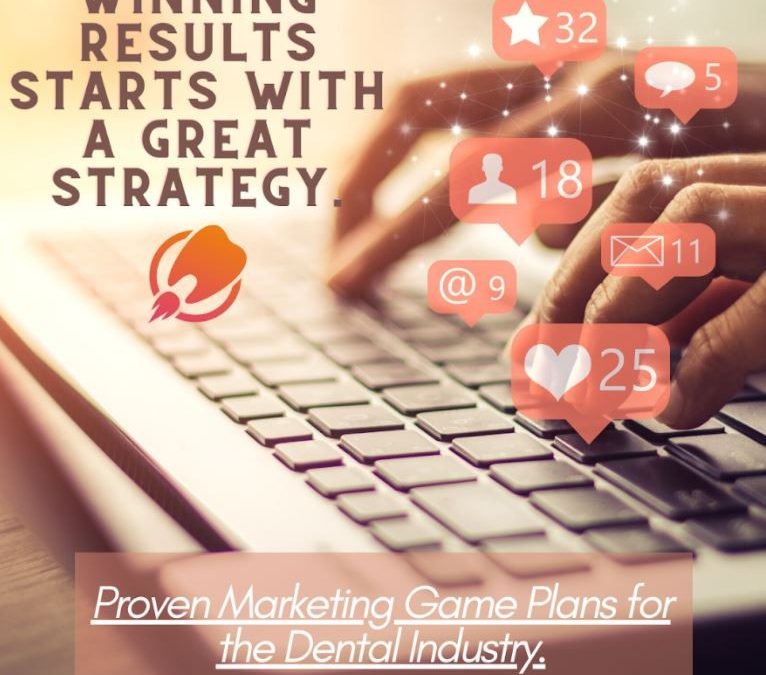
Our CEO Interviewed On The Winners Way Podcast
Check out our CEO, Chris Pistorius being interviewed by Bola Alabi of the “Winners Way Podcast“. They get into some great details on creative ways to market a local dental practice.
Read The Interview Below
Speaker 1: Hey everyone. Welcome to another episode of the winners with podcast. This podcast is where we talk about career. We talk about money. We talk about entrepreneurship. Uh, we will just want you to win and Excel your like, and today we have a guest with us. Uh, Chris bridge tur, uh, is the founder of kickstart dental. He is a marketing expert. He’s on, <inaudible> a podcast host and [00:00:30] is a coach. So he has multiple hearts. So we are gonna be learning from Chris today, as we diving into the, uh, online, uh, marketing space. Hey Chris, welcome to the show.
Speaker 2: Hey, thanks for having me. I appreciate it.
Speaker 1: Awesome. Uh, do you wanna just go ahead and introduce yourself to, to my audience so that they can yeah. Know you better?
Speaker 2: Yeah. You did a great job already, but yeah, I <laugh>, I’ve [00:01:00] uh, owned, uh, I’ve owned, kickstart dental marketing for about 12 and a half years now. Um, we focus on marketing for dental practices. We, I started it at zero. So from scratch, basically I learned a lot along the way. Unfortunately, I learned a lot about what not to do <laugh> so I like to, uh, I like to pass that knowledge on to anybody that’s willing to listen because, um, I wish I had more of that advice when I had started, but I live in Denver, Colorado. Uh, I have a team of 13 people. Um, [00:01:30] we’re all remote. I’m just working outta my office here. Um, I’m married, I’ve got two kids. I just sent one off to college and my son is 13 years old and keeps me very busy between work and work and him. <laugh>
Speaker 1: Fantastic. Uh, yeah, I like what you said as more to us. It is good to know what to do. It is also great to know what not to do. Yeah. So we, we are gonna be exploring all those details as we talk about [00:02:00] online digital marketing here. So, uh, why do you think it’s important, uh, to know how to market, uh, product or service? Why is that important?
Speaker 2: Yeah. Yeah. And just let me preface this by. Yeah, I’m in, I’m in dental marketing, but a lot of what I’m talking about really applies to any type of business you have, you know, if you’re a lawyer or an autobody mechanic or whatever, it may be, it really, it does apply. But you know, the thing about marketing is [00:02:30] that, you know, it’s no longer, um, good enough to just be in business, right? There’s a lot of competition in dentistry and you know, any local business, there’s more competition now than there’s ever been. And the internet has made marketing yourself, um, more complicated, meaning back in the day, <laugh>, you know, you guys are, you’re pretty young, but if you remember the yellow pages right back in the day, you could put an ad in the yellow pages, maybe do some direct mail [00:03:00] and you, that would work for you as a local business or a small business. Well, nowadays there’s 50 different places you could market online, right. With the internet and it’s built a lot of complexity. And if you don’t really know what you’re doing and you, you don’t really understand it, you can spend a lot of money doing that and not get the results that you want. And so the reason, and the importance of marketing is because of competition and just the mediums that are available to small and medium sized businesses.
Speaker 1: Oh, wow. [00:03:30] So when you consider, you spoke about yellow pages, uh, yeah, those ones I have gone now, I, I dunno if anyone still use those. Um, but I know about Facebook. I know about Google. Uh, Instagram is also there for people to market, uh, in your view, uh, Chris, which of this platform would give, uh, people the best return on their bulk, if they want to, you know, focus on online [00:04:00] a, uh, promotions.
Speaker 2: Yeah, that’s a great question. I get asked it a lot and there’s no easy answer. Unfortunately, it really depends on what you do and who your target market is. So one of the first things that we do when we take on a client is identify who it is that they wanna walk through the door. Who’s their, who’s their ideal client. And then we kind of reverse engineer from there. So if it’s, you know, you want the 25 to 35 year old female with two and a half kids and a golden retriever, then we need to market [00:04:30] where we know that those people, those types of people show up, right? So Facebook can be a great audience for that, but if you want maybe an older audience, that’s 45 to 65, you know, maybe has, uh, you know, medium income, whatever it may be, then that may be more of a Google type play.
Speaker 2: So there’s no, you know, silver bullet that says, this is what you should do. Um, I know in dentistry specifically, right now, what’s working well for us are TikTok ads, as you know, which sounds crazy. I know, [00:05:00] but what we’re seeing with TikTok advertising is that it’s doing a hockey stick right now in terms of going up and age. So we saw this with Facebook as well, when Facebook first started, it was mostly for kids and teenagers, right. And then gradually, you know, it’s gone up to an age to hold people like me using it. Well, TikTok is doing the same thing, but it’s doing it much, much more quickly. So the audience is getting much older, much quicker. So we are seeing some good results in TikTok. And I think that that strategy could [00:05:30] work for a lot of small businesses out there.
Speaker 1: Oh, wow. I, I did not know that, uh, people advertise on TikTok. I know, uh, TikTok is seriously, uh, giving Facebook Iran for its money because, uh, maybe people are spending time on TikTok videos. I, I never knew you could, uh, advertise on TikTok. Oh, that that’s good to know. Yeah. So what’s the role of, uh, such engine [00:06:00] optimization, S E O uh, on, you know, online art.
Speaker 2: Yeah. So SEO is a complicated beast. You know, it’s the art of, you know, getting your website to rank organically on Google, you know, not the paid section. It’s just the organic section, which is if you’re doing a local search or sometimes you see a map show up and then there’s like three or four listings there. And then underneath the map, that’s what we talk about with organic. Um, so there, it [00:06:30] used to be back in the day that you could do five or six things and probably get somebody to rank pretty highly on Google. Um, to today, it’s not that way. It’s much more complex. The Google algorithm is a set of rules that it’s over 200 different rules on what makes a website rank highly organically. Um, and they change those rules all the time. So companies like mine have to constantly be ahead of the curve and understand the algorithm and what it takes to really rank.
Speaker 2: But what I can tell you is that [00:07:00] there are some basic things that, that you need to know about SEO. And number one is relevance. You know, Google’s looking for relevant websites compared to how somebody searches. So if I do a search for a bankruptcy attorney in Denver, Colorado, it wants to see signals from websites that say, Hey, I’m a bankruptcy attorney in Denver, Colorado. Um, so it’s, it’s a lot about the relevancy of your website and the content on your website. Is it relevant to how people search on Google? [00:07:30] Right. Right. And then secondly, I think the most important thing about SEO is trust. Google has to trust your website before it’s gonna bring it back on the first page of Google. And so you need to send it a lot of trust factors, trust factors are things like content, right? Write a content is king write a lot of good quality content.
Speaker 2: It can’t be just like junk content that, you know, you, you can barely read. It needs to be quality content where you’re giving really good [00:08:00] advice, tips, tricks, frequently asked questions, things like that. Um, but it also, you also need to build trust in terms of how you link your website. So for instance, one of the big things that we do are, is called backlinking and people in the SEO world are nodding their head right now, but it’s basically a back link is a link from another website to your website. Right. Okay. Now it used to be, it didn’t matter the quality of the site that ranked to your website, Google saw all those back links and that it [00:08:30] was like a popularity contest. But now it’s really more about the quality of those links. You can’t just go get links from other websites and they all mean the same thing. If you can get a back link from like a very authoritative trustworthy website, like for instance, a news source mm-hmm <affirmative>, um, that counts very, very highly in Google’s eyes, cuz they can see these back links. Right. So I mean, we could spend, you know, hours just on this topic, but to me SEO’s all about trust [00:09:00] and content and you know, just being able to, um, show those signals.
Speaker 1: Oh wow. You know, um, you said SEO is about relevance, content, writing quality content, and you said, uh, trust and right, this is about, you know, sharing useful tips, tricks, advice, uh, for people so that they’ll, once they land on your website, you know, they will stay there, read your content, engage with your content. [00:09:30] And um, you know, with that way you’ll be able to, uh, build trust and, and that’s, uh, really, really important. Thank you very much. Uh, Chris for sharing that, uh, with us. Sure. I know you help, uh, local businesses, um, you know, to get, uh, online, um, recognition or, you know, to, uh, put them online. Now I, I want to ask how can, how do you do that and [00:10:00] how can local businesses leverage social media, you know, to attract more clients?
Speaker 2: Yeah. I, I think there’s two different versions of social media. Okay. So there’s the type of what I call organic social media, which is really, you know, people already follow your page or you get people to follow your page and you post on your page and the people that the people that follow your page have a pretty good chance of seeing what you posted, [00:10:30] what some people don’t realize is that just cuz you post on your page doesn’t mean that all the people that follow your page are always gonna see what you post because Facebook has, if they’re not paying, if people aren’t paying attention to your content, when you post and they don’t click on anything, then the chances go down that they’ll actually proactively see your contact. So the, the other reason Facebook has done this in other social media organizations is because they, they wanna make revenue.
Speaker 2: Right. Right. [00:11:00] So it’s, it’s really a big pay to play type model now. Right? So like when you do a post as a business, you can do like on Facebook, you can do a boost, a boost where you give them a little bit of money and then they’ll, they’ll, they’ll make sure that not only your audience sees your message, but you’re anybody like your audience too. Right? So they’ll go out and actually push it out there. So when you post organically, you know, you’re only getting a fraction of your followers who actually see this stuff. So it may be a good idea [00:11:30] to, to do some posts. But, and that, that takes me to the other side of social media, which is the ad advertising part of it where you can build advertising campaigns, you can target specific demographics. Um, you can, you can target income levels where people live all kinds of stuff and then create actual ad campaigns to target those people.
Speaker 2: Um, when we do social media marketing, we try to do a, a little bit of both. Um, my advice though is that don’t have [00:12:00] an agency like mine do a hundred percent of your organic social media. The reason for that is we can do some of the heavy lifting and we post a lot of good content, but it’s more general type content. It’s not like, you know, Hey, I’m in the office and somebody dressed up funny for Halloween. Let me take a picture and post it on Facebook. We can’t do that because we’re not there. So they, our clients still have an active role in organic social media. Uh, it’s just, we kind of, uh, pass off the torch if you little do in terms of, of posting. [00:12:30] So we help out with it. So in my opinion, those are the two ways to do social media for businesses and two similar, but very different things.
Speaker 1: Oh, thanks. So now let’s say I have a business, uh, maybe a dental priorities or any business for that matter. And I want to, you know, start promoting my business online. And uh, I reached out to you, uh, kickstart, uh, de dental marketing. How do you [00:13:00] start or how do you engage with, uh, your clients and help them to promote their business online? How does that process work?
Speaker 2: Yeah, the first thing we do is what we call a strategy session. So they, they that’s free of charge. That’s just kind of a get to know you, you get to know me type thing and we find out pretty quickly if we’re gonna be a good fit for them or if they’re gonna be a good fit for us. And you know, it’s sometimes it’s, it’s just not and that’s okay, but it’s better to figure that [00:13:30] out in the beginning than when you’re six months in. Right. So that’s where we start and we ask questions like, all right, you know, what services do you provide? What are your goals? What makes you different? Um, who do you want to come in the door? You know, things like that. And then we talk about budget. Do you have an allocated budget? And then, you know, once we’ve gotten through that process and we’ve done a proposal, then at that point, um, and they’ve signed off on it, they like what they see and they become a client.
Speaker 2: And the first thing that we do is what we call a launch party. [00:14:00] And essentially what we talk about in that launch party is all right, let’s identify your new patient avatars. So that is who it is that we want to come through the door. Like we talked about earlier, right? Mm-hmm <affirmative> and we, we set really clear on paper goals in terms of who we want to come in and it can be more than one avatar, but we at least gotta get that on paper. And then we also get on paper, what their unique selling proposition is. You see, I believe that every business, even if they’re in the same industry is different, right? So a dentist is different [00:14:30] than a dentist, right? There’s gotta be something unique about the business that makes them want to go there versus their competition. So we try to really work on that unique selling proposition and get that on paper as well. And then once we have that, we’ve really got the foundation and we know what to do then strategy wise with the marketing campaign. And so that’s, that’s pretty much the process from when they sign up to, to when the campaign starts.
Speaker 1: Perfect. So, you know, I’m asking that question so that maybe any of my audience, if they want to reach [00:15:00] out to you, connect with you, uh, they need help because I, myself, I’m struggling with these, uh, uh, digital online marketing. It’s, it’s a beast in my opinion. Yeah. Right. If you don’t know it, I I’ve run several Facebook, uh, ad. Yeah. Sometimes they work, sometimes they don’t. And I know if I know the process is gonna work, I’m struggling because I do not know. So for me, I know it’s always better to [00:15:30] have an expert that’ll, you know, hold my hands or guide me, help me so that I can figure it out. So that, that was why I has that question.
Speaker 2: Uh, yeah, for sure.
Speaker 1: The other thing that I do here is, uh, I try to give education to my audience. You know, if I have any resources or out there, I want them to be able to get their resources and use it to promote their business. And I saw that you have a book, uh, the ultimate [00:16:00] guide to internet marketing, uh, for dentist. Um, where can we get this book? That’s one, then two, can you just give us, uh, maybe the big idea of that book, you know, so that people will know, oh, this book would be useful for me or not.
Speaker 2: Yeah. Check this out. I’ve got one. There it is.
Speaker 1: <laugh> awesome. I see that.
Speaker 2: Yeah. Sorry. That’s blur vision, but yeah. So it’s on amazon.com, [00:16:30] uh, for sure, but I’ll tell you, I mean, if anybody, I don’t care if you’re a dentist or not, this book actually has a lot of stuff in it. That’s, that’s applicable for any type of small business. Um, but if, if anybody wants to reach out to me directly, just go to my website@kickstartdental.com. Um, and you reach out to me, just click the free strategy session button on there. I do all of those myself, no matter what industry you’re in, and I’ll give you free advice, I’ll talk to you, answer [00:17:00] your questions as much as I can about your industry, whatever you’re in. And I’ll also send you, uh, the book for free as well, but it’s also on amazon.com. So, uh, but the, the general idea is just if, if somebody, I mean dentists historically, and I think a lot of small businesses, you know, they go into business because they’re good at something.
Speaker 2: Right? Right. Well, a specific skill, you know, like a, an autobody guy’s good at repairing dents and working with cars, but they may not be great business people. Right. And they may not know how [00:17:30] to market themselves. And unfortunately, just because you’re good at a skill does not necessarily mean you’re gonna be successful in business. Mm-hmm <affirmative> right. Right. And so this book talks a lot about, you know, how to get your business set up to market it. And so you can get people in the door and get clients in the door. That’s bringing in revenue that which will make a successful business person. So it talks a lot about the tips and tactics around that.
Speaker 1: Oh, cool. So, in, in your opinion, Chris, what are the, maybe top two mistakes that [00:18:00] you see people make when it comes to maybe online, uh, marketing?
Speaker 2: I think the first mistake is they do nothing. Oh, right. <laugh> yeah. It’s serious because what happens is it’s, it’s complex, right. Like I said, it’s complicated. I mean, how do you know, do you do Google ads? Do you do Facebook ads? Do you buy a listing on some website, like on Yelp? I mean, what do you do? Right. And it’s overwhelming for business owners and I don’t blame ’em. And so what they, the, the kind of default mode is [00:18:30] I’m just gonna sit this out and keep doing what I do. And the problem with that is that your competition probably isn’t gonna do that and you’re gonna get passed up. Right. And we’re seeing that in the marketplace now of, you know, older generation dentists, who’ve been in business for 25, 30 years. They’re getting passed up by some of the younger competition now, because they’re not staying innovative and they’re not showing up high on Google and they’re not promoting themselves.
Speaker 2: They’re just kind of relying on that old patient base. So I think that’s one of the big mistakes [00:19:00] that I see. Um, the second mistake that I see probably is, you know, just not realizing that you need to be spending five to 7% of your gross income in marketing, whether it’s digital marketing, whether it’s you go buy a billboard heaven forbid you buy a yellow page ad, whatever it may be. You need to be investing some of your money into marketing, right. If you wanna stay ahead of the curve. Right. And so it kind of correlates with doing nothing, but, you know, a lot of people ask me, [00:19:30] you know, how much should I spend? How much does this cost? And if you do marketing the right way, it’s not a cost. It’s not like the light bill, right? It’s, this should be something that’s making you money, right. Three to $5 for every dollar that you spend. So when I get asked, I don’t wanna spend a lot of money. What, what should I spend at, it’s an automatic red flag, because they’re not thinking of it the right way. Mm-hmm, <affirmative>, you know, this should be something that grows their business. It’s not, you know, like an every month bill. So I think those are probably a couple of the biggest things that, that I see that [00:20:00] are mistakes.
Speaker 1: Good point on what you said that, um, the way people should view advertising is, uh, they return on their investment. Uh, they shouldn’t just see it as a cost. So if I spent $100, for example, how much of that am I getting back? Or what, what would I get, uh, in terms of sales in return, maybe if I’m making 200 or 300, then I know that, Hey, uh, by spending hundred, I’m getting 300, [00:20:30] then I, uh, I’m cash positive. Right. So that’s a good form of investment in my opinion. So that’s good. Um, now I, I know things has changed, especially since, uh, the pandemic. Um, I wanna ask, how has the, you know, COVID 19 changed, uh, your business and maybe your client’s businesses, uh, you know, as a result of this, uh, pandemic has, [00:21:00] what change have you seen?
Speaker 2: Yeah, I, well, I, I tell you, it was scary because really every dental practice in the us had to shut down for, I think it was at least 30 days and some longer, depending on where they were. So it was a complete shutdown. It was, um, you know, went from good revenue to zero revenue for a lot of our clients. So it was a scary time. But what I’ve seen coming out of that is more of, um, it’s been interesting, I’ve seen more like people trying to get into tele dentistry, so like doing [00:21:30] more virtual visits, which, which is a little harder with dentistry than it is like regular medical stuff. So I’ve, we’ve tested it and we’ve had mixed results to it, but I’ve seen a push for it, right. Like, okay, if this happens again, we kind of wanna be ready for it.
Speaker 2: Mm-hmm <affirmative> um, so there’s that. Um, but we’ve also seen more, more dentists for whatever reason come out of this, wanting to rely less on insurance. So they don’t necessarily want to take insurances anymore. They want to be fee for service [00:22:00] practices. Right. Um, because they’re able to make more money off of that and they don’t have to process paperwork and things like that. And one of the things they’re doing to offset that is they’re creating their own kind of internal insurance plan. Wow. Where it’s, where it’s like an in-house plan, if you will. Mm-hmm <affirmative>. So I think those are, that’s probably the biggest changes that I’ve seen, but I can tell you from the medical standpoint, things are getting a little bit back to normal. Right. But it’s still, there’s still a little like cautious optimism, I guess.
Speaker 1: You know what, [00:22:30] in the beginning of that, uh, pandemic, I remember I had a dentist appointment, uh, maybe about two weeks into the pandemic. I had to cancel it because I just felt like <laugh>, it’s not just necessary to go out there. So I totally understand that, uh, everything shows down, uh, during that, uh, time. So now, uh, regarding local businesses, um, I know there are quite a number of them [00:23:00] out there that want to create that, uh, visibility, uh, online visibility, what tips or tricks, uh, can you share with us, um, so that we can, you know, take this step and get, uh, the business name out there.
Speaker 2: Yeah. I think there’s a lot of tools that can help with that actually. Um, there’s a company out there called bright local, B R I G HT, L O C AO, uh, dot com. They’ve got a bunch of tools for small businesses that [00:23:30] can kind of type in your website and kind of gives you a report on what you’re doing. Well, what you’re not doing well, what your competition looks like, things like that. And I think that would be an excellent place to start. It’s kind of a basic, you know, kind of do it yourself type guide if you will. Um, we do find that clients start there and then they like, uh, you know what? I don’t wanna learn this crap. I’m just gonna have somebody professional do it for us. But if you’re a small business and you kind of wanna learn more about it and just kind of start getting your toes in the water on what’s [00:24:00] out there, I think that’s a good place to start.
Speaker 1: Awesome. So bright, local.com. So that’s good. I’m gonna leave that in the show notes. So as we are, uh, coming to the end of this interview, uh, Chris, I wanna ask, um, maybe you can tell my audience how they can connect with you, uh, you know, follow you, maybe whether you have any social media accounts so that it can continue to [00:24:30] learn, uh, from you. I, I know you have a podcast, if you can also give us the name of your podcast, uh, that they can take a listen. Yeah,
Speaker 2: Yeah. It’s called the dental marketing podcast. Again, don’t let the dental part of it scare you because a lot of what we talk about, you know, is, is practical for any type of business. Um, so that’s out there. Um, the best way to reach out to us, like I said earlier is probably just the website, kickstart dental.com. Um, there’s [00:25:00] a free strategy session button there. Go ahead and click it, schedule a time with me, and I’d be more than happy to give you, uh, some free advice for sure.
Speaker 1: Awesome. And, uh, that’s it, thank you very much. Uh, Chris, uh, for your time today, uh, it’s been wonderful, you know, learning from you and sharing your experience about online digital marketing and, uh, we appreciate your time.
Speaker 2: Thank you so much for having me.




